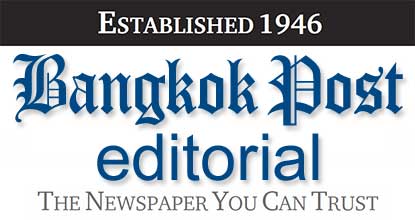
The attempt by the charter drafters to address hate speech formally by including it in the new constitution is one that will win agreement in principle. Before any anti-hate measures can be put into practice, however, several issues must be carefully considered to ensure the addition does not end up being abused to infringe on individual rights and media freedom.
The Constitution Drafting Committee (CDC) announced on Thursday that a specific clause forbidding the use of hate speech to instigate hatred, discrimination, hostility and violence will be introduced for the first time in the new charter.
It is actually about time Thai people recognise that expressing hate causes serious harm to people and that they do something to curb it.
Hate speech has played a major part in every political conflict the country has experienced. This is especially true in the case of the October 1976 massacre and recent political divisiveness that culminated in the 2010 deadly crackdown on red-shirt protesters.
The advances in communication technology and prevalence of social media make it easier for hate speech to proliferate. It’s thus encouraging that the constitution drafters understand the perils of hatred instigation and try to prevent it causing further tragedies.
To forbid hate speech, however, means there must be an appropriate law and judicial process to punish people who violate it. This is where the authorities must tread carefully.
The CDC said its definition of hate speech follows that of the International Covenant on Political and Civil Rights (ICPCR), which is any advocacy of national, racial or religious hatred that constitutes incitement to discrimination, hostility or violence. To make it more concise, the committee will put a note in the charter that hate speech must be a collective act by groups of people, not individuals.
In practice, it still will be highly debatable exactly what kind of expressions will be considered hate speech, what should be prohibited under the related law and what must be prosecuted as a crime.
Studies into the use of hate speech in the country have found there are varying degrees of it. Some kinds of hate speech may be effectively tackled by self-monitoring among the community while others are better curbed by legal means or state control.
Authorities must consider these distinctions and act accordingly to prevent anti-hate measures from being used to silence criticism or limit freedom of expression.
It must be noted also that forbidding hate speech essentially means placing a certain limit on freedom of expression. Some attributes of that limit may be internationally agreed but details do vary based on what each country defines as being "inviolable" to it. For some nations, it is skin colour. For others, it applies to the threat of violence, gender discrimination or war trauma.
Defining hate speech and curbing it will be a major challenge. If authorities define "hate speech" too narrowly, they will not be able to do anything about it. If it is defined too broadly, they will infringe on freedom of expression.
Members of the media have expressed concern that prohibition of hate speech could be misused to restrict press freedom. They have a reason to feel so as experience during the past few years of political conflicts have shown how public figures resort to all methods to silence critics.
Curbing hate speech is a step in the right direction. It will be a long road ahead to put measures into action and authorities must handle the issue with the utmost care.